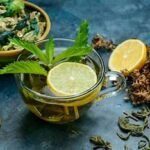Herbal Remedies for Colds
- By -Maria Joseph
- Posted on
- Posted in Traditional Herbs
Catching a cold is a common experience, particularly during the colder months. While there’s no cure for the common cold, several herbal remedies can help alleviate symptoms, shorten the duration of illness, and support your immune system. Many of these remedies have been used for centuries in traditional medicine systems like Ayurveda, Chinese Medicine, and Western herbalism. In this article, we’ll explore some of the most effective herbal remedies for colds and how they work to boost your health and promote recovery.

Echinacea
Echinacea (Echinacea purpurea) is one of the most widely known herbs for preventing and treating colds. It has a long history of use in Native American medicine as a remedy for infections. Echinacea is believed to stimulate the immune system, increasing the body’s ability to fight off viruses and bacteria.
- How It Helps: Echinacea works by stimulating white blood cells and increasing the production of interferons, proteins that help the body fight viral infections. This makes it particularly effective at reducing the severity and duration of cold symptoms.
- Studies: Several studies suggest that echinacea can reduce the duration of cold symptoms by up to 30%. Some research indicates that taking echinacea at the first sign of a cold can help reduce symptoms and speed up recovery.
- Usage: Echinacea is commonly consumed as a tea, tincture, or in capsule form. It is most effective when taken at the onset of cold symptoms.
Elderberry
Elderberry (Sambucus nigra) is known for its potent antiviral properties, making it a popular herbal remedy for colds and flu. Elderberries contain high levels of anthocyanins, antioxidants that support the immune system and help fight viral infections.
- How It Helps: Elderberry has been shown to inhibit the replication of viruses, particularly the flu virus, and can help reduce the severity of symptoms. It works by blocking the ability of the virus to enter cells, thereby preventing infection from spreading.
- Studies: A study published in The Journal of International Medical Research found that elderberry extract reduced the duration of flu symptoms by 4 days compared to a placebo. Similar benefits have been observed for the common cold.
- Usage: Elderberry is typically consumed in syrup, tea, or capsule form. It’s important to ensure the elderberries are properly prepared, as raw elderberries can be toxic. Elderberry syrup is one of the most popular ways to use this herb.
Ginger
Ginger (Zingiber officinale) is another powerful herb that has been used for centuries for its medicinal properties. It is particularly effective for soothing a sore throat, alleviating congestion, and reducing inflammation.
- How It Helps: Ginger has anti-inflammatory, analgesic (pain-relieving), and antiviral properties. It helps to relieve sore throat pain, clear nasal passages, and reduce inflammation in the respiratory tract. Additionally, ginger helps to warm the body and improve circulation, which can help expel mucus and ease breathing.
- Studies: Research indicates that ginger can help reduce symptoms of the common cold and flu. It has also been shown to inhibit viral replication and may reduce the severity of respiratory symptoms.
- Usage: Fresh ginger can be brewed into a tea, or its juice can be added to warm water with honey and lemon. Ginger is also available in tincture or capsule form.
Peppermint
Peppermint (Mentha piperita) is a cooling and soothing herb commonly used to relieve symptoms of colds, especially congestion and headaches. The active compound in peppermint, menthol, helps clear nasal passages and has a calming effect on the respiratory system.
- How It Helps: Peppermint is known for its ability to relieve nasal congestion by opening the airways, making it easier to breathe. Menthol also has analgesic properties, which can help reduce headaches and muscle aches associated with colds. Additionally, peppermint can soothe an irritated throat.
- Studies: Some studies have shown that menthol can help relieve congestion by relaxing the muscles around the nasal passages, promoting easier airflow. Menthol also acts as a mild anesthetic to reduce throat discomfort.
- Usage: Peppermint tea is an easy and soothing way to use this herb. Alternatively, peppermint oil can be diluted and applied topically to the chest or used in a steam inhalation to relieve nasal congestion.
Conclusion
Herbal remedies have long been used to treat the symptoms of the common cold and support the body’s natural healing process. From boosting the immune system with echinacea and elderberry to soothing sore throats with licorice root and thyme, these herbs offer natural and effective ways to ease cold symptoms and promote recovery. Always remember to consult with a healthcare provider before starting any new herbal remedy, especially if you have underlying health conditions or are taking medications.



